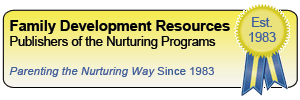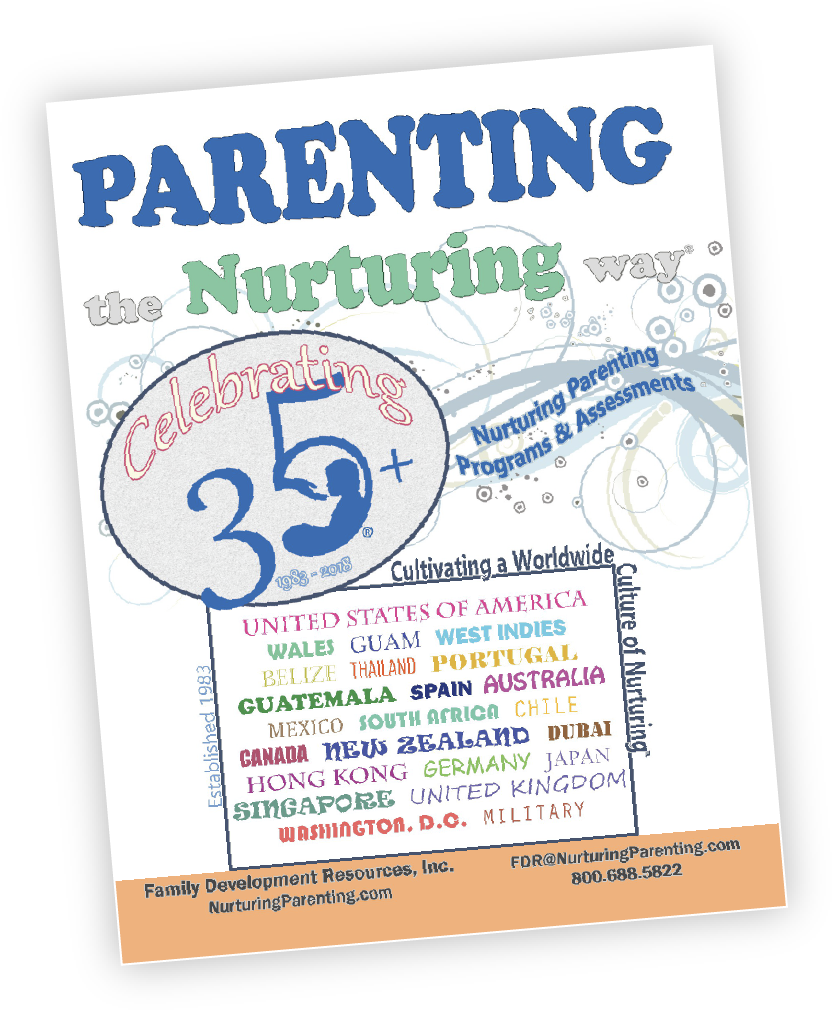The Nurturing Parenting Programs are a family-centered trauma-informed initiative designed to build Nurturing Parenting skills as an alternative to abusive and neglecting parenting and child-rearing practices.
The long term goals are to prevent recidivism in families receiving social services, lower the rate of multi-parent teenage pregnancies, reduce the rate of juvenile delinquency and alcohol abuse, and stop the intergenerational cycle of child abuse by teaching positive parenting behaviors.


Founded by Dr. Stephen J. Bavolek, Ph. D, Family Development Resources, Inc. (FDR) has been developing the Nurturing Parenting Programs and promoting non-violent parenting practices since 1983.
Dr. Bavolek has conducted numerous workshops, has appeared on multiple radio and television talk show programs, and has published numerous books, articles, programs and newsletters. Dr. Bavolek is the principal author of the Nurturing Parenting Programs designed to prevent and treat child abuse and neglect. He is also the author of the Adult-Adolescent Parenting Inventory (AAPI), an inventory designed to assess high risk parenting attitudes.
With over 100 Trainers/Consultants worldwide, FDR has has sold over 1 million copies of their English and Spanish Parent Handbooks, and is continuing to develop new programs. Families from all over the world (including the US, England, Australia, Germany, Mexico, New Zealand, Singapore, South Africa, and Canada) have had the opportunity to benefit from the Nurturing philosophy of parenting; and in all branches of the military, families are using the Nurturing Parenting Programs to improve their parenting skills.
Dr. Bavolek has received numerous international, national, state and local awards for his work. He is a recognized leader in the fields of child abuse and neglect treatment and prevention, and parenting education. Born and raised in Chicago, Dr. Bavolek's professional background includes working with emotionally disturbed children and adolescents in schools and residential settings, and abused children and abusive parents in treatment programs. Family Development Resources, Inc., is the only company authorized to publish and sell programs and philosophies originally authored and developed by Dr. Bavolek.


Family Development Resources is committed to meeting the unique needs of families. To this end, approximately 30 programs or program models are available that are designed to meet the family’s educational learning styles and abilities; the family’s culture and language; the ages of the children as well as the ages of the parents.
The first step in implementing the Nurturing Parenting Programs is to select the right program(s) for the families you are serving.



Each lesson offered in the Nurturing Programs has identified competencies the parents need to learn and the instructors need to teach in order for parenting practices to improve. The lesson competencies keep both the parent and the instructor on track making sure learning is occurring. The individual lessons, assessments, evaluations and home practice assignments are all designed to ensure parents are acquiring the stated competencies.
In competency based learning, if the parents do not display an understanding or proper utilization of the information and skills presented in the lesson, the lesson is repeated until the competencies have been learned and mastered.

Assessment is a process where Instructors of the Nurturing Programs gather information from families in order to learn more about them. Such data would include information about their current life conditions, their childhood, their relationship with their partner, their relationship with their children, how much they already know about parenting, and the beliefs they have about raising children. Assessments in the Nurturing Programs occur at three times:
Evaluation is a process that measures the degree of acquisition and accuracy of new knowledge and new skills made by the parents. It also measures the effectiveness of the instructor’s abilities to present new concepts and new skills to parents in a manner that allows the parents to increase their understanding of the new concepts and value the utilization of the new skills. Teaching and learning are partners in a relationship of dependency. Neither one works as well alone as they do together.
Assessment and Evaluation data are gathered using valid and reliable self-report inventories and rating scales, as well as observing parent-child interactions. All the data collection is designed to ensure parents are acquiring the knowledge and skills in developing their Nurturing Parenting competencies.

The Nurturing Programs incorporate three pre and posttest self-report assessment measures:
Adult-Adolescent Parenting Inventory (AAPI) is a 40 item, norm-referenced, Likert scale designed to assess the parenting beliefs and practices of adult and adolescent parent and non-parent populations. The AAPI is designed to assess the beliefs for parenting children from infancy to 12 years of age. Responses to the AAPI provide an index of risk for child maltreatment in five parenting practices known to result in child maltreatment. These practices are presented as Constructs:
Responses to the AAPI provide a level of risk for child maltreatment on three levels: High, Moderate and Low. These levels of risk on the AAPI coordinate with the levels of prevention and dosage of lessons presented in the Nurturing Parenting Programs.
Form A and Form B: There are two versions of the AAPI: Version A and Version B. Using alternate forms of the AAPI to gather pre and post program responses reduces the likelihood of increased positive parenting responses based on practice in completing the same inventory multiple times.
Parenting Attitudes about Raising Teens Inventory (PARTI) is a norm- reference Likert scale designed to assess the parenting beliefs and practices of raising adolescent’s ages 12 to 20 years of age. There are two versions of the PARTI: one version for the Parents and one version for the Teens. Data generated from the administration of the PARTI can be useful in several settings:
Responses to the PARTI are entered in the computer and a parenting profile is created reflecting the similarities and differences between the parents and their teens. Responses are presented in five categories:
These responses provide an index and level of conflict and agreement: high, moderate and low levels of conflict or agreement.
The Nurturing Skills Competency Scale (NSCS) is a criterion-referenced scale designed to gather information in six constructs that can have a significant role in family dysfunction including child abuse and neglect and intimate partner violence. The six constructs of the NSCS are:
There are two different versions of the NSCS that are designed for two different populations of parents you might be working with:

As parent educators, we want to make sure the parents are learning the knowledge and skills presented in the program. Gathering information during the program to ensure parents are learning is called process evaluation. Process evaluation occurs at the end of each class session. If the parent has not adequately learned the information and skills, the lesson is repeated. There are three process evaluation measures used in the Nurturing Programs.
Individual Session Evaluations are utilized in group-based programs. Towards the end of each session, parents rate the degree they feel they have learned each of the specific lesson competencies. A rating of 0 means the parent has “not learned the competency at all”; 1 indicates the parent has learned the competency “a little bit”; 2 indicates “pretty good” understanding of the competency; and 3 indicates the parent has a “really good” understanding and grasp of the lesson competency.
Concurrently, the instructors are also rating each parent on how well they learned each of the lesson competencies. Ratings by the instructors occur when parents are demonstrating skills with their child (ren) during Family Nurturing Time, and/or how well they do in explaining concepts during class time.
The Nurturing Parenting Programs have several unique features that make the programs effective:
The Nurturing Parenting Programs are recognized by the Substance Abuse and Mental Health Services Administration (SAMHSA), the National Registry for Evidence-based Parenting Programs (NREPP),and a number of state and local agencies as proven programs for the prevention and treatment of child abuse and neglect.
The Departments of the Army and Navy utilize the Nurturing Parenting Program to enhance parenting skills for first time parents in bases world wide.
ACCESS THE RESEARCH AND VALIDATION STUDIESLocated in our Training Resources Section is a listing of our national training workshops and a listing of trainers in your state. Learn how to have you and your colleagues trained in the Nurturing Parenting Programs!
The Family Development Resources Logo is a Registered Trademark of Family Development Resources, Inc. For permission to use the Family Development Resources Logo call 800.688.5822 or FDR@NurturingParenting.com